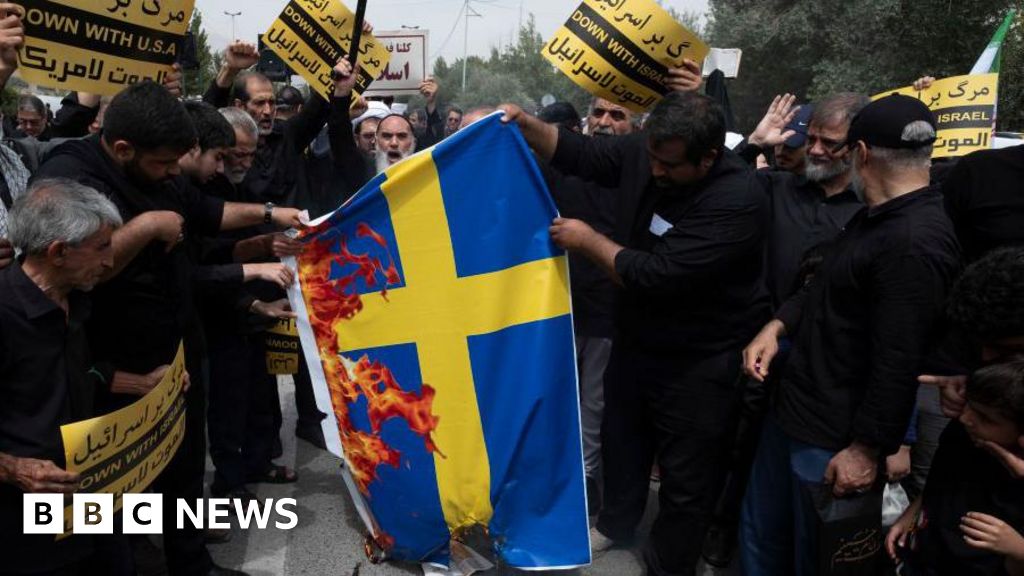Sweden has accused Iran of orchestrating a cyber-attack that followed several incidents of Quran burnings in 2023. The attack involved hacking into a text messaging service to incite violence and sow discord within Swedish society. This action is believed to have been carried out by a cyber group working for Iran’s Islamic Revolutionary Guard Corps.

Also Read: UNGA Adopts Pact for the Future Despite Russia’s Opposition
In 2023, Sweden saw a series of public protests where individuals burned copies of the Quran, Islam’s holy book. These events were protected under Sweden’s freedom of speech laws, which safeguard public expression even when it involves actions that offend religious groups.
The burnings led to condemnation from Muslim-majority countries. Protests erupted in several regions including Tehran, where Iranian demonstrators burned the Swedish flag in retaliation.
Security Service has accused Iran of orchestrating a cyber-attack in response to the Quran burnings. According to Swedish intelligence, a group called Anzu, which acts on behalf of the IRGC, hacked into a Swedish SMS operator’s system in August 2023.
The group allegedly sent out around 15,000 text messages to Swedish citizens. These messages called for violent revenge against those responsible for desecrating the Quran.
The hackers sought to portray Swedish people as an Islamophobic country and to incite division within Swedish society. One of the messages said, “Those who insulted the Quran must be punished for their work.”
In August 2023, thousands of Swedish citizens received 15,000 text messages in Swedish, allegedly sent by Iran’s Revolutionary Guard Corps (IRGC). These messages called for revenge on those involved in the Quran burnings labeling Swedes as demons.
According to SAPO, this operation was carried out through a data breach at a major Swedish SMS service provider. However, the specific company involved has not been disclosed.
The messages were attributed to a group called the Anzu team, who allegedly acted on behalf of the IRGC, urging acts of violence against Quran desecrators.
Swedish authorities believe the aim of the text campaign was to destabilize Swedish society by encouraging internal division. Create an image of Sweden as a country hostile to Islam and fuel Islamophobic perceptions within and outside the country.
Increase tensions among the country’s Muslim population and the larger society, polarizing public opinion. Fredrik Hallström, SAPO’s operational manager stated that this foreign influence campaign shows a trend of aggressive actions by external actors aiming to exploit societal vulnerabilities.
Prosecutors and SAPO carried out a investigation concluding that Iran was responsible for the breach and SMS campaign. Senior prosecutor Mats Ljungqvist confirmed Iran’s involvement specifically naming the IRGC as the actor behind the breach.
Swedish authorities have closed the investigation citing the impossibility of prosecuting the suspects involved, given their foreign location and state affiliations. Authorities have made it clear that the investigation could be reopened if new evidence or circumstances arise.
Iran has denied the accusations through a statement from its embassy in the country calling the claims baseless and asserting that they are an attempt to damage relations between the two countries.
The Iranian government has requested that Sweden prevent the spread of such allegations, which it deems to be politically motivated.
Also Read: Ukraine Ban Telegram for Government Devices
Sweden’s relations with Iran have been strained in recent years largely due to the 2019 arrest and 2022 conviction of Hamid Noury, a former Iranian prison official.
Noury was sentenced to life imprisonment in Sweden for his involvement in the 1988 mass executions of political prisoners in Iran.
In June 2024, a prisoner swap took place between the two nations. Noury was released by Sweden in exchange for Johan Floderus, an EU diplomat and Saeed Azizi, a Swedish national arrested in Iran.
SAPO alleged in May 2024 that Iran had been actively recruiting members of criminal gangs to act as proxies for acts of violence against Israeli and other interests in Sweden.
These allegations suggest that Iran is engaging in cyber warfare and also actively manipulating local criminal networks to carry out covert operations in foreign countries.
The Quran burnings and the reaction to them have sparked debates in Sweden over freedom of speech. The country has no specific laws against the desecration of religious texts as it does not have blasphemy laws.
The constitution guarantees the right to freedom of expression, but the incidents involving the Quran have questions about the limits of free speech when it comes to offending religious groups.
The government condemned the burnings while maintaining that it could not infringe upon individuals’ constitutional rights to protest, even when those protests involved the desecration of sacred texts.
Investigations by Swedish authorities have pinpointed the Anzu team as the group responsible for hacking the SMS service.
Acting on behalf of the IRGC, this group infiltrated a Swedish company’s system and took over usernames, passwords and tools to send out the mass messages.
Although Swedish investigators have succeeded in identifying the individuals behind the attack, they have acknowledged the limitations of prosecuting foreign nationals acting under the direction of a state power.
The investigation remains closed for now, but authorities have not ruled out the possibility of reopening it should new evidence arise.
Also Read: Anura Kumara Dissanayake Elected as Sri Lanka’s President 2024



















